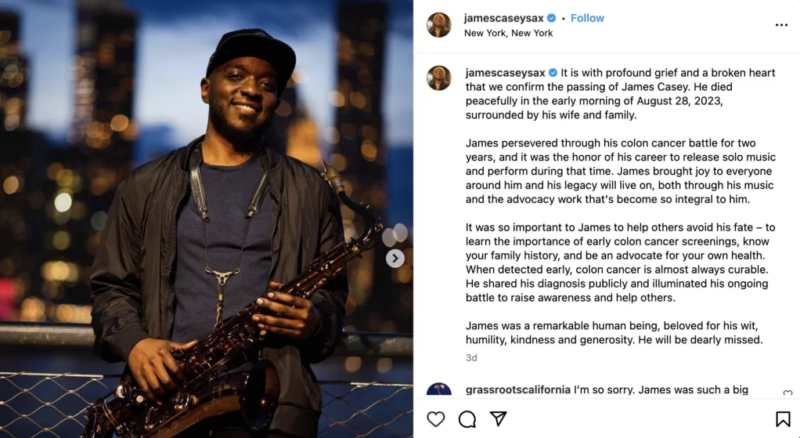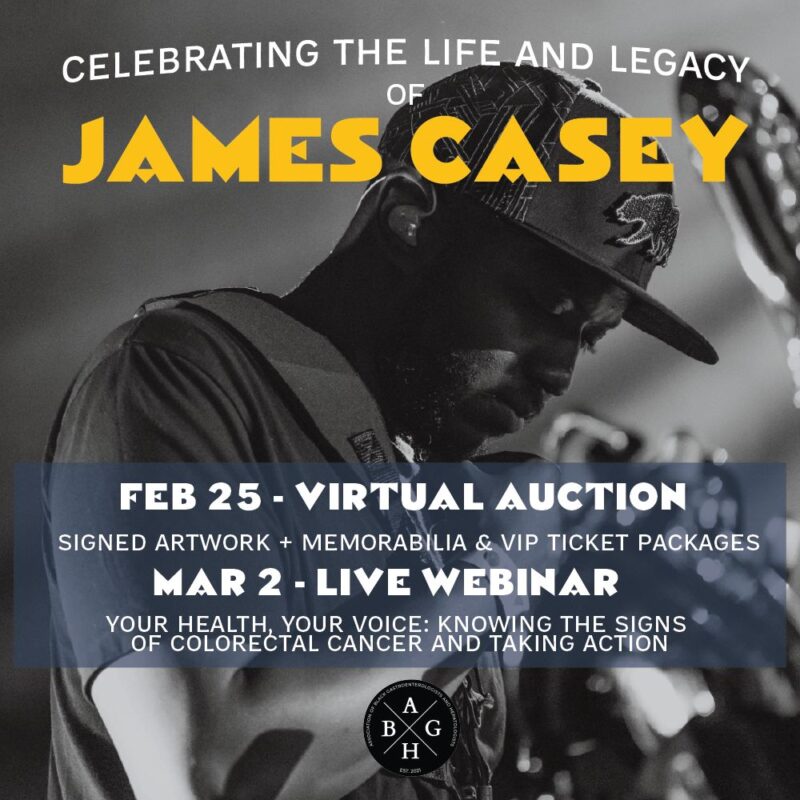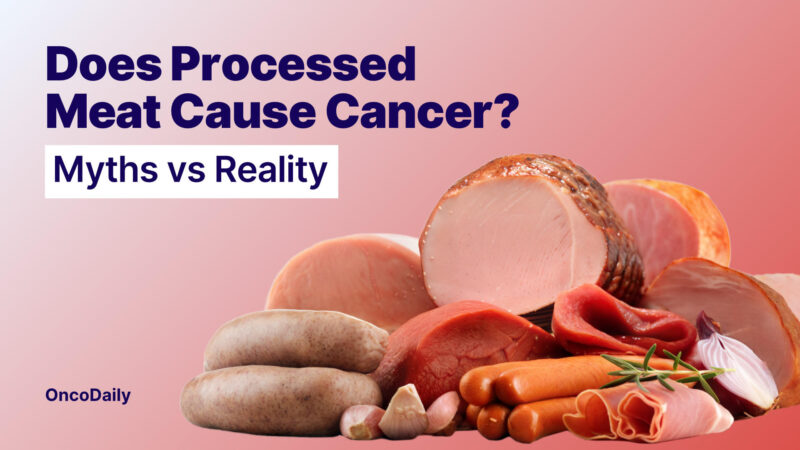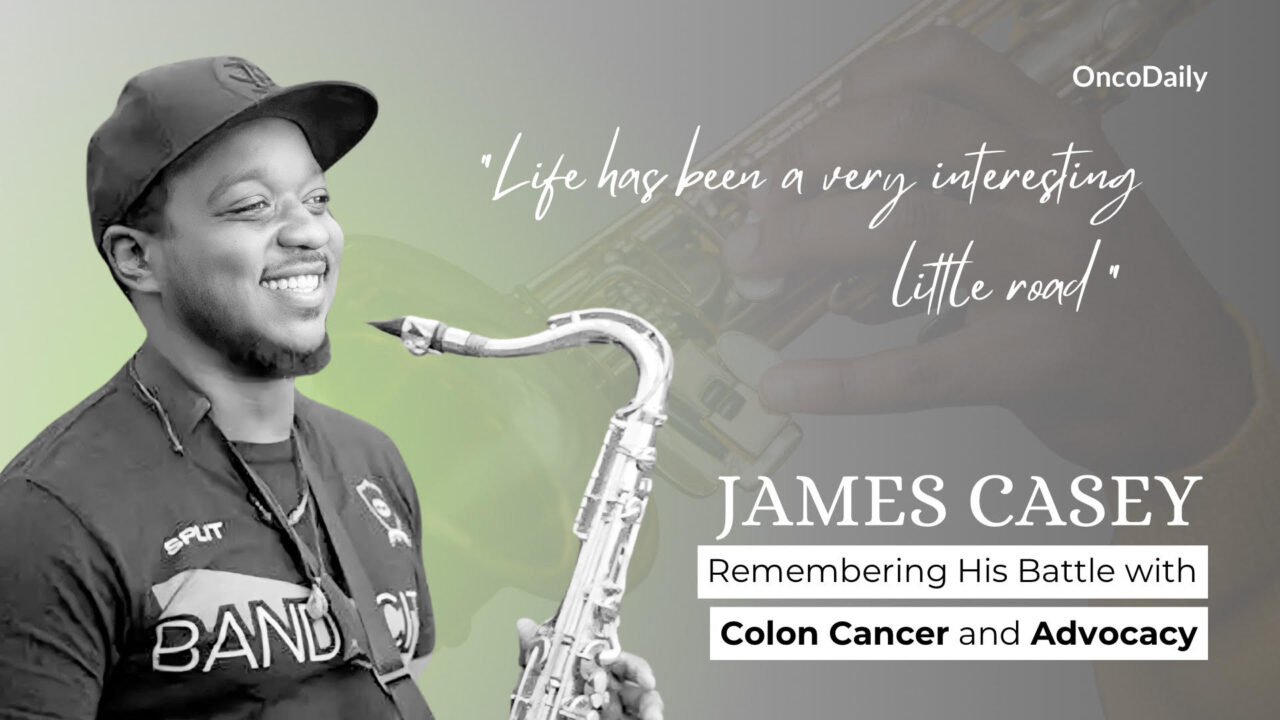James Casey, the celebrated saxophonist best known for his electrifying performances with the Trey Anastasio Band, has died at the age of 40 after a courageous battle with colon cancer. A vibrant and influential figure in the music scene, Casey’s talent extended beyond the stage as he became a passionate advocate for colon cancer awareness and early screening. Diagnosed with Stage III colorectal cancer at age 38, which later progressed to Stage IV, Casey openly shared his journey, using his platform to educate and inspire others.

Photo by Steph Port
James Casey about his diagnosis
At the age of 38, James was diagnosed with Stage III colorectal cancer In November 2021, which later advanced to Stage IV. On his YouTube channel, he talked about his diagnosis.
“I’m James Casey, I’m 39 years old and I’m dealing with stage IV colon cancer, so like Life changed drastically and when that happened I realized that I have to put something out I’ve never done anything of my own I almost passed just now there is no Legacy left for me”.
He often wrestled with the nagging feeling of inadequacy, the persistent whisper that his efforts fell short of some imagined ideal. There was always a future version of himself, more skilled, more articulate, more worthy, to whom he deferred the real work, the meaningful expression. He labored under the illusion that one day, he would finally “arrive,” equipped with the tools and confidence to truly make his mark.
“Life has been a very interesting little road for the last year and a half but during this recovery, I finished the record i had time to sit here and really craft something and I’m really proud of what I did”
James Casey’s Music Career
James Casey was a gifted saxophonist, composer, and producer who made a significant impact on the music world. Born in Washington, D.C., and raised in Phoenix, Arizona, Casey discovered his love for music at a young age. Encouraged by his mother, a singer, he initially took up drums but later transitioned to the saxophone, which became his signature instrument.
He honed his skills at Berklee College of Music, where he refined his technique and broadened his musical horizons. Casey’s career took off as he performed alongside prominent artists, including The Roots, Meghan Trainor, and Lettuce, earning recognition for his ability to blend jazz, funk, and rock into a unique and electrifying sound. However, his most notable work was with the Trey Anastasio Band, where he became a beloved member known for his soulful performances and charismatic stage presence. His powerful saxophone solos and ability to connect with audiences set him apart as a truly special musician. Trey Anastasio said:
“James Casey was a phenomenal talent, his energy and passion were infectious. He brought so much joy to the stage and to everyone who knew him.”
James Casey’s Advocacy for Colon Cancer
James Casey, the talented saxophonist and colon cancer advocate, engaged in significant advocacy efforts during his battle with the disease, collaborating with various health organizations to raise awareness and support for colorectal cancer (CRC) screening and education.
Despite facing significant health challenges, Casey remained committed to his advocacy work. He continued to perform music while undergoing treatment, using his platform to educate others about colon cancer. His efforts aimed not only to raise awareness but also to encourage individuals to seek screenings early, as he believed that early detection could save lives.Casey’s advocacy has left a lasting impact, inspiring many within the music community and beyond to prioritize health screenings and address health disparities faced by marginalized communities. His legacy continues through ongoing educational efforts led by his family and supporters, ensuring that his message about the importance of colon cancer awareness endures.
Collaboration with Health Organisations
James Casey actively advocated for colon cancer awareness, using his platform to highlight the disparities faced by Black Americans in accessing timely diagnoses and treatment. He participated in the “Colorectal Cancer in Young Black Americans” webinar organized by the Association for Black Gastroenterologists and Hepatologists (ABGH), where he shared his personal experiences and underscored the systemic barriers that delay diagnosis in communities of color.
In collaboration with the Colorectal Cancer Alliance, Casey contributed to raising awareness and funding for screening initiatives. The proceeds from his 2022 holiday album, “A Little Something for Everyone,” were donated to this cause, with the goal of improving access to screenings for uninsured patients. He also supported The Nancy Langhorne Foundation, a nonprofit providing free screenings for uninsured individuals, through fundraising efforts such as releasing a charity Christmas EP.
Additionally, in March 2023, Casey released a mini-documentary titled Music As Medicine: A James Casey Story in partnership with Olympus Corporation of the Americas. The documentary openly shared his cancer journey and emphasized the critical need for early detection, particularly highlighting the disproportionate impact of colon cancer on the Black community. Through these efforts, James Casey left an indelible mark on colon cancer advocacy and awareness.

Support From Family and Friends
James Casey received immense support from his loved ones and the music community throughout his battle with colon cancer. His wife, Ayla Cobb Casey, was a constant source of love and care, not only providing support but also becoming an advocate for caregivers by sharing her personal experiences. Surrounded by family, James passed away peacefully on August 28, 2023, after a two-year battle with cancer. Friends from the music community, including Margaret Willard, rallied together to organize a GoFundMe campaign to help cover James’ medical and living expenses, allowing him to focus on his health.
Trey Anastasio, his bandmate, expressed his heartbreak and celebrated James’ spirit and musical legacy, while acknowledging Ayla’s loving care. James also recognized the importance of health professionals, particularly one doctor who played a key role in saving his life. Additionally, Deondre Williams and Rebecca Bixby shared their experiences at an awareness event with Ayla following James’ passing, furthering their commitment to spreading awareness.
Charity Auction and Webinar for Colorectal Cancer Awareness in Memory of James Casey
In memory of celebrated saxophonist James Casey, who passed away from early onset colon cancer in 2023, an auction, webinar, and screening drive are being organized timed to the kick off of Colorectal Cancer Awareness Month. His wife, Ayla, is organizing these events to continue James’ advocacy work, spreading education about colorectal cancer trends and risks, especially among young people:
- 2/25-3/2: Charity Auction – Featuring exclusive artist-donated pieces, custom guitar by Dave Matthews and VIP ticket packages from Trey Anastasio and others. Proceeds fund screenings for uninsured individuals.
- 8pm 3/2: Webinar “Your Health, Your Voice: Knowing the Signs of Colorectal Cancer and Taking Action.” – Learn about colon cancer prevention and James’s story from medical experts and advocates.
Spread the Word – Raise awareness and encourage early screenings to help save lives. Check out our screening tool at getscreened.org.

For event information and to register visit James Casey Birthday Benefit
Key Statistics and Insights on Colon Cancer
Each year, approximately 150,000 new cases of colorectal cancer are diagnosed in the United States alone, according to the American Cancer Society. Tragically, it is also the second leading cause of cancer-related deaths, claiming nearly 53,000 lives annually. Early detection plays a critical role in survival. When colon cancer is found at a localized stage, the five-year survival rate is around 91%. However, if the cancer spreads to distant organs, this rate drops significantly, underscoring the importance of regular screenings and timely intervention. In recent years, an alarming trend has emerged—colon cancer is increasingly affecting younger adults. Cases like James Casey’s serve as a stark reminder that this disease is not limited to older populations.
What Can Cause Colon Cancer?
Colorectal cancer is a major health concern, with most cases occurring sporadically. However, genetic predisposition plays a role in a subset of patients. Inherited mutations, such as those seen in Lynch syndrome (HNPCC) and familial adenomatous polyposis (FAP), account for a small percentage of cases, while many others have a strong family history without a detectable mutation. Age remains a key risk factor, with most diagnoses occurring after 65. A family history of colorectal cancer significantly increases risk, as do inherited syndromes like Lynch syndrome and FAP. Certain precancerous polyps, particularly villous adenomas, and sessile serrated polyps, also heighten the likelihood of malignancy.
Chronic conditions like inflammatory bowel disease further elevate risk, particularly in patients with long-standing ulcerative colitis or Crohn’s disease. Lifestyle factors also play a critical role. Diets high in red and processed meats, excessive alcohol consumption, smoking, obesity, and insulin resistance all contribute to colorectal cancer development. Prior radiation exposure and immunosuppression further increase susceptibility. On the other hand, protective factors include regular physical activity, fiber-rich diets, certain vitamins and minerals, garlic, coffee, and medications like aspirin and NSAIDs, though the strength of evidence varies. At a molecular level, colorectal cancer progresses through three main pathways.
The chromosomal instability (CIN) pathway, seen in most cases, involves mutations in APC, KRAS, and TP53, driving abnormal cell growth. The mismatch repair (MMR) pathway, associated with microsatellite instability (MSI), is common in Lynch syndrome and sporadic right-sided tumors, which tend to be more responsive to immunotherapy. The CpG island methylator phenotype (CIMP) pathway leads to abnormal gene silencing and is often linked to serrated polyps and BRAF mutations. Advancements in genetic research have identified four molecular subtypes of colorectal cancer, each with distinct biological behavior, though these classifications have yet to be widely used in clinical practice.
Despite its complexity, colorectal cancer is largely preventable through lifestyle modifications and early detection via screening. Understanding risk factors and genetic influences can help individuals take proactive steps to reduce their likelihood of developing the disease.
You Can Also Watch Young Colorectal Cancer Survivor: Mila’s Journey of Resilience & Hope | Beyond the Cancer Diagnosis by OncoDaily

Symptoms, Diagnosis, and Treatment of Colon Cancer
With the rise of routine screening for colonoscopies, many colon cancers are now detected before symptoms appear. When symptomatic, presentation varies based on tumor location and size. Rectal bleeding, abdominal pain, and anemia are the most common symptoms prompting further evaluation. Right-sided tumors often cause anemia, while left-sided tumors frequently lead to bowel habit changes. In severe cases, patients may present with surgical emergencies like obstruction, perforation, or bleeding. A thorough physical exam is essential, with a focus on signs of metastatic disease. Abdominal exams assess tenderness, masses, and organ enlargement, while rectal exams are crucial for detecting malignancy and evaluating sphincter function. Diagnosis relies on colonoscopy, which has high sensitivity when performed by experienced operators.
Additional tests, including blood work and tumor markers like CEA, help assess prognosis and recurrence risk. Guidelines recommend universal MMR/MSI testing for all newly diagnosed patients, as this impacts treatment decisions in up to 20% of cases. Mutation testing for KRAS, NRAS, HER2, and BRAF is crucial in metastatic disease. Imaging, including CT scans of the chest, abdomen, and pelvis, is standard for staging, while MRI is reserved for suspected liver metastases.
PET-CT is not routinely recommended. Surgical removal is the primary treatment for resectable colon cancer, with the approach varying based on tumor location and stage. Lymph node removal and surgical techniques are tailored to each case. Adjuvant chemotherapy is recommended for certain advanced cases, while metastatic disease is typically treated with systemic therapy. Radiation is rarely used, but surgery may sometimes be performed to alleviate symptoms in patients with advanced disease. What 99% of people don’t know about Colorectal Cancer
How Can Colon Cancer Be Prevented?
Maintaining a healthy weight is crucial for lowering the risk of colorectal cancer, as being overweight or obese, particularly with excess belly fat, increases the risk. Monitoring body mass index (BMI) and striving for a healthy weight can help reduce this risk. Regular physical activity, such as aiming for at least 30 minutes of moderate to vigorous exercise most days of the week, also lowers the risk of colorectal cancer and polyps.
A fiber-rich diet, high in fruits, vegetables, and whole grains, is beneficial for reducing risk by promoting regular bowel movements and gut health. Reducing the intake of red meats (beef, pork, lamb) and processed meats (bacon, sausage, hot dogs) is recommended, as these foods may increase the risk. Limiting alcohol consumption, particularly to one drink per day for women and two for men, helps reduce the risk of colorectal cancer, especially among men. Lastly, smoking is a major risk factor for many cancers, including colorectal cancer, so quitting smoking is essential for lowering the risk.
Regular Screenings
Regular colorectal cancer screenings, starting at age 45, are crucial for early detection and prevention. Screening tests, like colonoscopies, can identify precancerous polyps and remove them before they develop into cancer. These screenings also help detect cancer early when treatment is most effective. Colonoscopies are generally recommended every 10 years, but individuals at higher risk may need to begin screening earlier or undergo more frequent tests.
You Can Also Read Does Processed Meat Cause Cancer, Myths and Facts by OncoDaily

Three Pieces of Advice from James Casey
The advice attributed to James Casey regarding colon cancer prevention is correct and reflects his personal experiences and advocacy efforts. Here’s a summary of his key points:
Know Your Family History: Casey emphasized the importance of understanding one’s family medical history, noting that he was unaware of the cancer that ran in his family. He urged others to communicate their family history to help identify potential risks.
Get Screened: He strongly advocated for regular screenings, especially for those with a family history of colon cancer. Casey stated, “it’s 100% preventable if you do,” highlighting the critical role of early detection in improving outcomes.
Be Your Own Advocate: Casey encouraged individuals to advocate for their health by speaking up about any concerns during medical appointments. He stressed the importance of not ignoring symptoms and ensuring that doctors take their concerns seriously.
Written by Mariam Khachatryan, MD
FAQ
What was James Casey's profession, and how did he become involved in colon cancer advocacy?
James Casey was a renowned saxophonist, best known for his work with the Trey Anastasio Band. He became an advocate for colon cancer awareness after being diagnosed with stage 3 colon cancer in 2021. Throughout his treatment, he continued to perform music and raise funds for screenings through organizations like the Colorectal Cancer Alliance.
How did James Casey's diagnosis occur?
Casey experienced severe abdominal pain while performing at Red Rocks Amphitheatre. Initially misdiagnosed with colitis, he underwent emergency surgery after returning to the ER a third time, where a stage 3 tumor was discovered.
What were some of the challenges James faced during his battle with colon cancer?
Despite undergoing surgery and chemotherapy, the cancer progressed to stage 4. He faced significant health challenges but continued advocating for early detection and screening throughout his illness.
How did James use his platform to raise awareness about colon cancer?
Through interviews on platforms like TODAY, releasing music albums (e.g., A Little Something For Everyone), and partnering with organizations such as Olympus Corporation of Americas on documentaries (Music As Medicine: A James Casey Story), he emphasized the importance of screenings and shared personal insights into living with colorectal cancer.
What legacy does James leave behind regarding colorectal health advocacy?
His legacy includes inspiring others through music while raising awareness about disparities in healthcare access that affect Black Americans disproportionately regarding colorectal cancer diagnosis and treatment outcomes.
Who were some of the key figures in James Casey's life during his battle with colon cancer?
James was supported by his wife, Ayla Cobb Casey, who played a crucial role in caring for him throughout his illness. His bandmates and friends from the music community also provided emotional support and tributes after his passing.
How did friends and fans react to James Casey's death?
The news of James' passing was met with an outpouring of grief from fellow musicians like Trey Anastasio, Billy Strings, Phil Lesh, Louis Cato, Oteil Burbridge, Goose members, Dave Matthews Band members Nigel Hall among others. A memorial concert held at Brooklyn Bowl raised over $32,000 for the Colorectal Cancer Alliance and Association of Black Gastroenterologists and Hepatologists (ABGH), reflecting the impact he had on both the music world and those touched by his advocacy work


